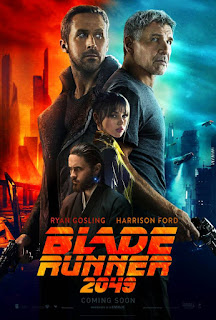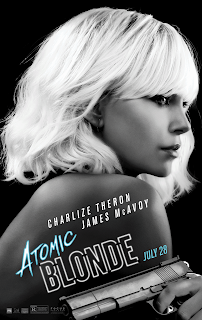Blade Runner 2049 - Review
Director: Denis Villeneuve
Cast: Ryan Gosling, Harrison Ford, Robin Wright, Jared Leto
It's been 35 years since Ridley Scott's Blade Runner. Upon its release, it underwhelmed at the box office and divided critics but in the three decades that have passed, it has become a staple of the sci-fi genre and heralded as one of the best films of all time. French-Canadian director Denis Villeneuve, responsible for hits such as Sicario and Arrival, is now at the helm of expanding the fictional universe with Blade Runner 2049 and has the pressure of delivering not just a piece of entertainment, but a cinematic experience that can match the impact of it predecessor.
Replicant Officer KD6 - 3.7 (Ryan Gosling), referred to as K, is a Blade Runner tasked with "retiring: old and discontinued Nexus 8 models. During an assignment, K discovers a buried box containing a secret that could disrupt the world's order as he knows it that sets him off on an entirely different mission.
Expanding any further on the plot beyond the synopsis would step into spoiler territory and severely ruin the cinema-going experience. The trailers and promotional marketing for the film have remarkably kept the plot shrouded in secrecy, only promising fans crisp visuals, the return of Rick Deckard and an extension of the world that Ridley and co started back in 1982. Villeneuve has delivered on that promise in spades and subsequently delved deeper into the rich mythology inspired by Philip K. Dick's Do Androids Dream of Electric Sheep?. Gosling's K, as a protagonist, is not really comparable to Ford's Deckard - he is without swagger or charisma, but he is no less compelling. Throughout Blade Runner 2049's 2 hour 40+ minute run time, we are completely invested in following K's journey as he uncovers shocking evidence that chips away at his composed and steely exterior as his humanity fights for prominence.
Ryan Gosling as Officer K is perfectly cast and the two-time Oscar nominee channels his character in the 2011 film Drive, conveying internally the conflict that K experiences as he begins to question his true purpose and have emotions that are alien and dangerous. Meanwhile, Harrison Ford reprises the role that he originated over 30 years ago and his return as Rick Deckard is nothing but triumphant. Deckard is living a solitary life and lies under the radar until K has cause to seek him out. Ford maintains the wry wit and forceful nature that made Deckard an iconic character, but in Blade Runner 2049, the former Blade Runner is slightly more haggard and emotionally affected by the significant change the world has undergone.
Blade Runner 2049 deftly marries the legacy of the 80s classic while introducing audiences to new and exciting innovations, with the collaboration between director Denis Villeneuve and cinematographer Roger Deakins (the pair have partnered twice before on Prisoners and Sicario) being a primary element. In competition, and a definite frontrunner, for the most beautiful film of 2017, Deakins reinforces the widely accepted notion that he is a master of his profession and one of the best in the business and his work here should finally be the one to bring him the overdue glory that he so rightly deserves. The story tends to unfold at a glacial pace but the gorgeous scenery and cinematography provides us with endless visual stimulation and poetically composed frames to gawp at. Everything captures is purposeful and laced with intent, just like K, until he uncovers information that could revolutionise society. The visuals remain meticulously crafted and have stronger echoes of Replicant design, even as K inches closer toward humanity.
An optical spectacle with a story that subverts expectations, Blade Runner 2049 is further proof that Villeneuve and Deakins are two of the best film-makers in their field working today - and that not every blockbuster needs a caped superhero.
EB
Cast: Ryan Gosling, Harrison Ford, Robin Wright, Jared Leto
It's been 35 years since Ridley Scott's Blade Runner. Upon its release, it underwhelmed at the box office and divided critics but in the three decades that have passed, it has become a staple of the sci-fi genre and heralded as one of the best films of all time. French-Canadian director Denis Villeneuve, responsible for hits such as Sicario and Arrival, is now at the helm of expanding the fictional universe with Blade Runner 2049 and has the pressure of delivering not just a piece of entertainment, but a cinematic experience that can match the impact of it predecessor.
Replicant Officer KD6 - 3.7 (Ryan Gosling), referred to as K, is a Blade Runner tasked with "retiring: old and discontinued Nexus 8 models. During an assignment, K discovers a buried box containing a secret that could disrupt the world's order as he knows it that sets him off on an entirely different mission.
Expanding any further on the plot beyond the synopsis would step into spoiler territory and severely ruin the cinema-going experience. The trailers and promotional marketing for the film have remarkably kept the plot shrouded in secrecy, only promising fans crisp visuals, the return of Rick Deckard and an extension of the world that Ridley and co started back in 1982. Villeneuve has delivered on that promise in spades and subsequently delved deeper into the rich mythology inspired by Philip K. Dick's Do Androids Dream of Electric Sheep?. Gosling's K, as a protagonist, is not really comparable to Ford's Deckard - he is without swagger or charisma, but he is no less compelling. Throughout Blade Runner 2049's 2 hour 40+ minute run time, we are completely invested in following K's journey as he uncovers shocking evidence that chips away at his composed and steely exterior as his humanity fights for prominence.
Ryan Gosling as Officer K is perfectly cast and the two-time Oscar nominee channels his character in the 2011 film Drive, conveying internally the conflict that K experiences as he begins to question his true purpose and have emotions that are alien and dangerous. Meanwhile, Harrison Ford reprises the role that he originated over 30 years ago and his return as Rick Deckard is nothing but triumphant. Deckard is living a solitary life and lies under the radar until K has cause to seek him out. Ford maintains the wry wit and forceful nature that made Deckard an iconic character, but in Blade Runner 2049, the former Blade Runner is slightly more haggard and emotionally affected by the significant change the world has undergone.
Blade Runner 2049 deftly marries the legacy of the 80s classic while introducing audiences to new and exciting innovations, with the collaboration between director Denis Villeneuve and cinematographer Roger Deakins (the pair have partnered twice before on Prisoners and Sicario) being a primary element. In competition, and a definite frontrunner, for the most beautiful film of 2017, Deakins reinforces the widely accepted notion that he is a master of his profession and one of the best in the business and his work here should finally be the one to bring him the overdue glory that he so rightly deserves. The story tends to unfold at a glacial pace but the gorgeous scenery and cinematography provides us with endless visual stimulation and poetically composed frames to gawp at. Everything captures is purposeful and laced with intent, just like K, until he uncovers information that could revolutionise society. The visuals remain meticulously crafted and have stronger echoes of Replicant design, even as K inches closer toward humanity.
An optical spectacle with a story that subverts expectations, Blade Runner 2049 is further proof that Villeneuve and Deakins are two of the best film-makers in their field working today - and that not every blockbuster needs a caped superhero.
EB




Comments
Post a Comment